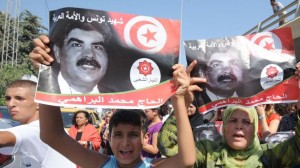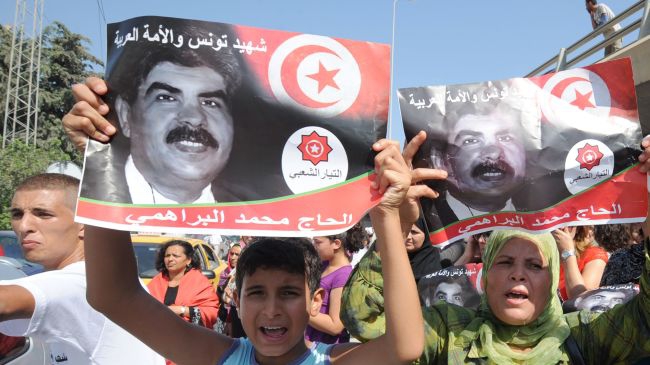 Tunisian police forces use tear gas to disperse thousands of angry protesters who had gathered near constituent assembly to protest the recent assassination of a leading opposition figure.
Tunisian police forces use tear gas to disperse thousands of angry protesters who had gathered near constituent assembly to protest the recent assassination of a leading opposition figure.Thousands of furious protesters chanted slogans against the government led by the ruling Ennada Party and held the authorities responsible for the lack of security. The security forces used tear gas and rubber bullets to disperse the crowds.
The fresh wave of protests came hours after a funeral procession was held in the Tunisian capital for the assassinated opposition figure Mohamed Brahmi. Thousands of people joined the funeral on the streets of Tunis.
Brahmi's body has been taken to the cemetery where another assassinated opposition politician Shukri Belaid has been laid to rest. Brahmi was assassinated outside his home in the Tunisian capital on Thursday.
The assassinations of opposition figures have triggered nationwide demonstrations, with protesters calling on the government to step down. Several opposition groups have staged protest rallies and a general strike over the latest political assassinations in the North African country.
At least one protester has died and several others injured during the ongoing violent clashes with security forces.
Officials say they�ve identified the assassin. The Tunisian Interior Minister Lotfi Ben Jeddou said on Friday that the assassination of Brahmi was the work of a member of the extremist Salafist movement, adding, "The first elements of the investigation show the implication of Boubaker Hakim, a Salafist extremist."
The Interior Ministry also said the opposition politician was murdered with the same weapon used in the killing of another opposition figure February this year.
Tunisia has seen numerous clashes between the authorities and extremist groups over the past few months.
Tunisia, the birthplace of pro-democracy protests across North Africa and the Middle East, is struggling with a democratic changeover after the overthrow of its dictator in 2011.
The moderate ruling party Ennahda was elected following the ouster of former dictator, Zine El Abidine Ben Ali, in January 2011.
By Press TV
The Iran Project is not responsible for the content of quoted articles.











